介 词1(老师)
英语 名形动副数冠代介感连 知识整理
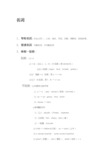
名词1、专有名词(开头大写):人名、地点、节目、日期、电影名、机构名等。
2、普通名词:可数名词、不可数名词3、单数→复数:规则:⑴+s⑵+es : ①以s、x、ch、sh结尾(除stomachs)②以o结尾(negro、hero、tomato、potato)⑶以“辅音+y”结尾,把y → i+es⑷以f、fe结尾,把f、fe → v+es不规则:⑴内部有元音字母① a → e :wan、woman(特殊:Germans)②oo → ee:goose、foot、tooth③mouse → mice⑵单复数同形①三人:people、Chinese、Japanese②三动物:fish、sheep、deer(鹿)③一度量:jin/yuan⑶ child → children(小孩) ox → oxen(公牛)⑷ a woman teacher. some women teachers.⑸ proof(证据)、root(屋顶)、belief(信仰)+ s4、名词所有格:⑴+’s:①普通名词、专有名词②以-s结尾的普通名词⑵+’ : ①以-s结尾的复数名词②以-s结尾的专有名词⑶几人共有时,在最后+’s(eg. Tom and Mike’s room.)⑷of引导句子从后开始解释(er. The of my mother)①有生命:n. of n.②无生命: n. of n.’s动词1、助动词2、情态动词⑴直接+动词原形⑵无人称和数的变化⑶可用于提问和肯否定回答(eg. Must we call the doctor? —Yes, we must./No, we needn’t.=we don’t have to.)⑷否定直接+not⑸分类① 有过去时can →could may →might will →would shall →should ② 没有时态变化must(=have to)、need ③ 推测④双重词性(实意动词、情态动词)need 、dare(敢于)(eg. He need go to school. He needs to go school.)3、 系动词(+adj.)① 似乎::seem 、appear ② be 动词③ 感官动词:smell (闻)、sound (听)、taste (尝)、look (看)、feel (感) ④ 变化:turn 、go 、become 、get 、grow 、come 、full ⑤ 不变:keep 、remain 、stay ⑥ 终止:prove 、turn out4、 实意动词:及物动词vt.、不及物动词vi.副词1、位置:实前、情be后、助后(除sometimes)2、频率副词always﹥usually﹥often﹥sometimes﹥seldom(很少) ﹥hardly﹥never1、基数词(多少)2、序数词(第几)一二三特殊记,th从四加起,八去t,九去e,f来把ve替,ty变成tie,若是遇到几十几,只变个位就可以。
高考英语一轮复习:介词和介词短语

介词和介词短语(Prepositions)重点用法①介词的种类1.根据形式可以将介词分为简单介词(如in,on,for等)、合成介词(如inside,without等)、双重介词(from behind,from among等)、动词-ing形式的介词(如including,regarding等)和短语介词(如in front of,out of等)。
根据意义可将介词分为表示时间、场所、方向等的介词,介词在句中不能独立做成分。
2.表示时间的介词after在……之后before在……之前around大约……at在……时by到……为止in在……后on在……时till/until直到……3.表示场所、方向的介词across在……对面along沿着……at在……in在……里on在……上above在……上方under/below在……下面beside在……旁边behind在……后面before/in front of在……前面between在……之间among在……之间4.其他介词about关于;对于from从;自从with与……一起;用of……的;属于……的to向;到;对as担任;像;作为for对于;为了;给……besides除了……还有重点用法②表示时间的常用介词辨析用法:1.at表示时刻、时间的某一点;on表示具体的某一天,某一天的上、下午;in表示月、季节、年,泛指上午、下午、晚上(在一段时间内)。
at lunch在午餐时on Monday在周一in January在一月2.before表示“在……之前”;after表示“在……之后”。
I will be back before lunch.午饭之前我赶回来。
The nights start after half past five in winter.冬天的夜晚在5点半之后开始。
3.by表示“在……之前,截止到……”;until/till表示“直到……为止”;by表示到什么时候为止动作已经完成,而until表示动作持续到什么时候,在终止性动词的否定式中,二者通用。
英语什么是介词分类及用法
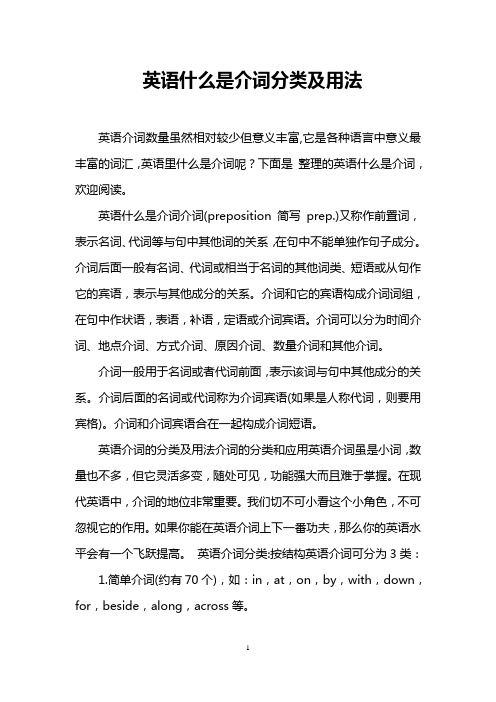
英语什么是介词分类及用法英语介词数量虽然相对较少但意义丰富,它是各种语言中意义最丰富的词汇,英语里什么是介词呢?下面是整理的英语什么是介词,欢迎阅读。
英语什么是介词介词(preposition 简写prep.)又称作前置词,表示名词、代词等与句中其他词的关系,在句中不能单独作句子成分。
介词后面一般有名词、代词或相当于名词的其他词类、短语或从句作它的宾语,表示与其他成分的关系。
介词和它的宾语构成介词词组,在句中作状语,表语,补语,定语或介词宾语。
介词可以分为时间介词、地点介词、方式介词、原因介词、数量介词和其他介词。
介词一般用于名词或者代词前面,表示该词与句中其他成分的关系。
介词后面的名词或代词称为介词宾语(如果是人称代词,则要用宾格)。
介词和介词宾语合在一起构成介词短语。
英语介词的分类及用法介词的分类和应用英语介词虽是小词,数量也不多,但它灵活多变,随处可见,功能强大而且难于掌握。
在现代英语中,介词的地位非常重要。
我们切不可小看这个小角色,不可忽视它的作用。
如果你能在英语介词上下一番功夫,那么你的英语水平会有一个飞跃提高。
英语介词分类:按结构英语介词可分为3类:1.简单介词(约有70个),如:in,at,on,by,with,down,for,beside,along,across等。
2.分词介词(约15个)如:during,following,considering,regarding,speaking,judging,talking等。
3.成语介词(约有500个)如:out of,apart from(除之外:别无、尚有),because of,by means of用、依靠等。
按意义英语介词可分为3类:1. 时间介词,如:at, on, in, during, over, from, for, until等。
2. 地点介词,如:at, on, in, across, to, over, between, inside, outside等。
初中英语语法知识—介词的知识点(1)
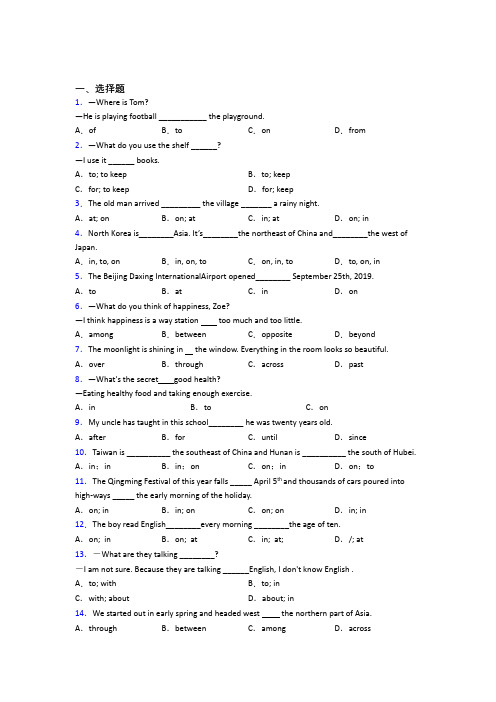
解析:A
【解析】
【详解】
句意:那位老人在一个雨夜到达了那个村庄。
本题考查介词。at在,on在……上面,in在……里。arrive at表示到达小地点;arrive in表示到达大地点。到达一个小村庄,用arrive at。表示在一个下雨的夜晚,用介词on。故选A。
4.B
解析:B
【解析】
【详解】
A.afterB.forC.untilD.since
10.Taiwan is __________ the southeast of China and Hunan is __________ the south of Hubei.
A.in;inB.in;onC.on;inD.on;to
11.The Qingming Festival of this year falls _____ April 5thand thousands of cars poured into high-ways _____ the early morning of the holiday.
C.for; to keepD.for; keep
3.The old man arrived _________ the village _______ a rainy night.
A.at; onB.on; atC.in; atD.on; in
4.North Korea is________Asia. It’s________the northeast of China and________the west of Japan.
【解析】
【详解】
句意:——你使用那个架子干什么?——我用它来保存书籍。
考查介词用法和不定式作宾语补足语。to表示目的或意图;keep保存;for为了。分析句子结构可知要用介词for与疑问句what搭配表示“为了什么”,to后需接动词原形构成不定式,不符合题意;use sth. to do sth.用某物来做某事,第二空用动词不定式表目的。故选C。
1介词between和among的用法及区别
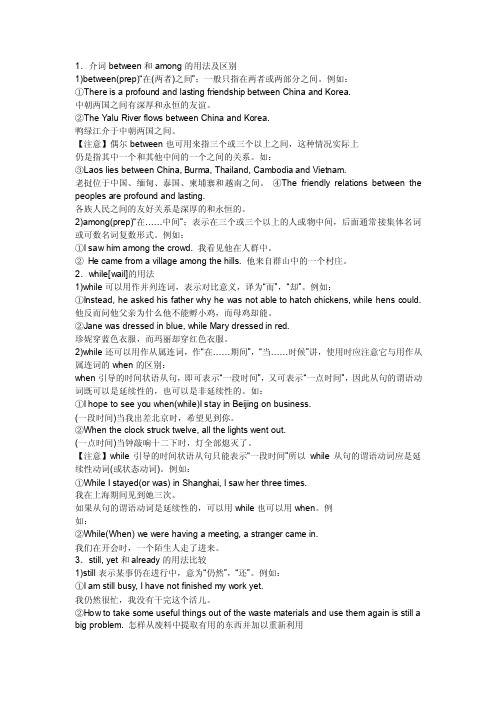
1.介词between和among的用法及区别1)between(prep)“在(两者)之间”;一般只指在两者或两部分之间。
例如:①There is a profound and lasting friendship between China and Korea.中朝两国之间有深厚和永恒的友谊。
②The Yalu River flows between China and Korea.鸭绿江介于中朝两国之间。
【注意】偶尔between也可用来指三个或三个以上之间,这种情况实际上仍是指其中一个和其他中间的一个之间的关系。
如:③Laos lies between China, Burma, Thailand, Cambodia and Vietnam.老挝位于中国、缅甸、泰国、柬埔寨和越南之间。
④The friendly relations between the peoples are profound and lasting.各族人民之间的友好关系是深厚的和永恒的。
2)among(prep)“在……中间”;表示在三个或三个以上的人或物中间,后面通常接集体名词或可数名词复数形式。
例如:①I saw him among the crowd. 我看见他在人群中。
②He came from a village among the hills. 他来自群山中的一个村庄。
2.while[wail]的用法1)while可以用作并列连词,表示对比意义,译为“而”,“却”。
例如:①Instead, he asked his father why he was not able to hatch chickens, while hens could. 他反而问他父亲为什么他不能孵小鸡,而母鸡却能。
②Jane was dressed in blue, while Mary dressed in red.珍妮穿蓝色衣服,而玛丽却穿红色衣服。
英语介词的用法总结(完整版)
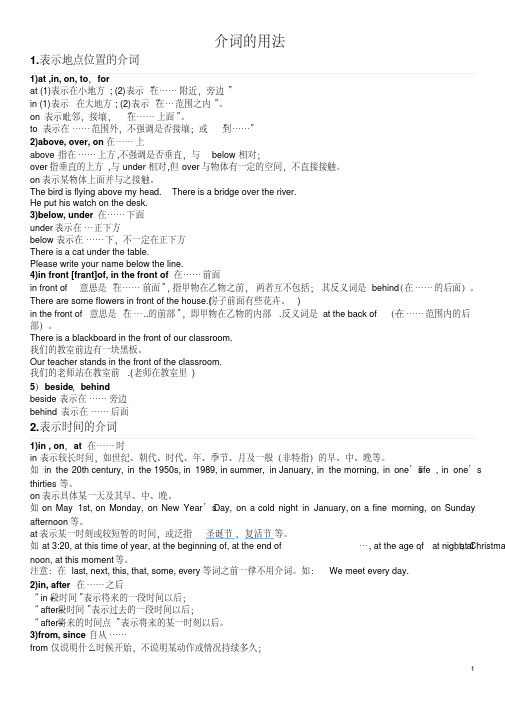
介词的用法1.表示地点位置的介词1)at ,in, on, to,forat (1)表示在小地方; (2)表示“在……附近,旁边”in (1)表示在大地方; (2)表示“在…范围之内”。
on 表示毗邻,接壤,“在……上面”。
to 表示在……范围外,不强调是否接壤;或“到……”2)above, over, on 在……上above 指在……上方,不强调是否垂直,与below相对;over指垂直的上方,与under相对,但over与物体有一定的空间,不直接接触。
on表示某物体上面并与之接触。
The bird is flying above my head. There is a bridge over the river.He put his watch on the desk.3)below, under 在……下面under表示在…正下方below表示在……下,不一定在正下方There is a cat under the table.Please write your name below the line.4)in front [frant]of, in the front of在……前面意思是“在……前面”,指甲物在乙物之前,两者互不包括;其反义词是behind(在……的后面)。
in front of…There are some flowers in front of the house.(房子前面有些花卉。
)in the front of 意思是“在…..的前部”,即甲物在乙物的内部.反义词是at the back of…(在……范围内的后部)。
There is a blackboard in the front of our classroom.我们的教室前边有一块黑板。
Our teacher stands in the front of the classroom.我们的老师站在教室前.(老师在教室里)5)beside,behindbeside 表示在……旁边behind 表示在……后面2.表示时间的介词1)in , on,at 在……时in表示较长时间,如世纪、朝代、时代、年、季节、月及一般(非特指)的早、中、晚等。
【初中英语】介词(1)
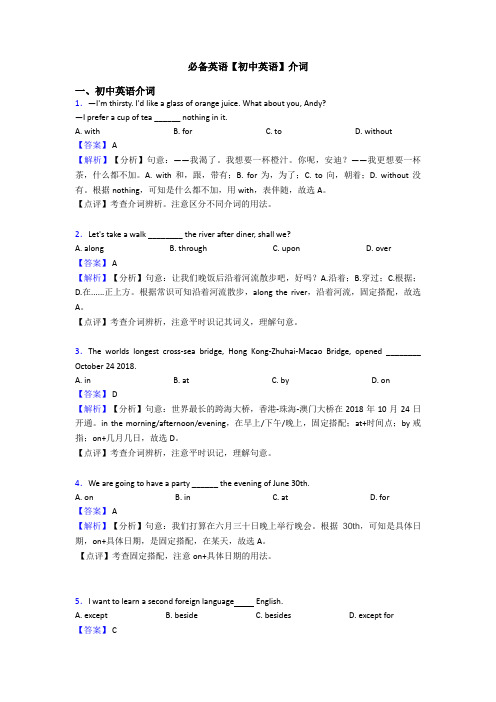
必备英语【初中英语】介词一、初中英语介词1.—I'm thirsty. I'd like a glass of orange juice. What about you, Andy?—I prefer a cup of tea ______ nothing in it.A. withB. forC. toD. without【答案】 A【解析】【分析】句意:——我渴了。
我想要一杯橙汁。
你呢,安迪?——我更想要一杯茶,什么都不加。
A. with 和,跟,带有;B. for 为,为了;C. to 向,朝着;D. without 没有。
根据nothing,可知是什么都不加,用with,表伴随,故选A。
【点评】考查介词辨析。
注意区分不同介词的用法。
2.Let's take a walk ________ the river after diner, shall we?A. alongB. throughC. uponD. over【答案】 A【解析】【分析】句意:让我们晚饭后沿着河流散步吧,好吗?A.沿着;B.穿过;C.根据;D.在......正上方。
根据常识可知沿着河流散步,along the river,沿着河流,固定搭配,故选A。
【点评】考查介词辨析,注意平时识记其词义,理解句意。
3.The worlds longest cross-sea bridge, Hong Kong-Zhuhai-Macao Bridge, opened ________ October 24 2018.A. inB. atC. byD. on【答案】 D【解析】【分析】句意:世界最长的跨海大桥,香港-珠海-澳门大桥在2018年10月24日开通。
in the morning/afternoon/evening,在早上/下午/晚上,固定搭配;at+时间点;by戒指;on+几月几日,故选D。
【点评】考查介词辨析,注意平时识记,理解句意。
老师介绍信
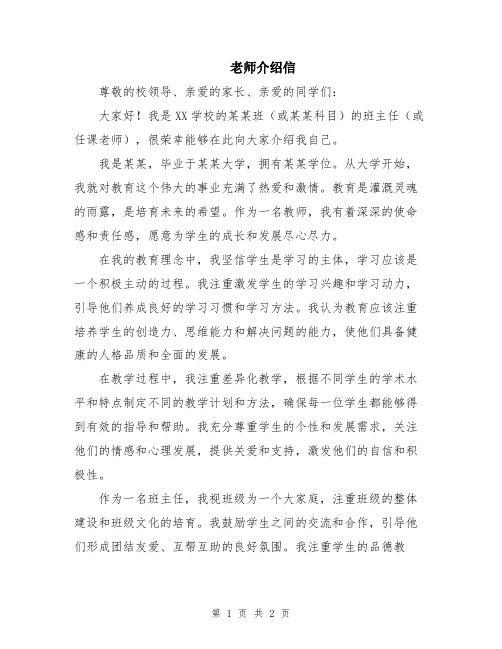
老师介绍信尊敬的校领导、亲爱的家长、亲爱的同学们:大家好!我是XX学校的某某班(或某某科目)的班主任(或任课老师),很荣幸能够在此向大家介绍我自己。
我是某某,毕业于某某大学,拥有某某学位。
从大学开始,我就对教育这个伟大的事业充满了热爱和激情。
教育是灌溉灵魂的雨露,是培育未来的希望。
作为一名教师,我有着深深的使命感和责任感,愿意为学生的成长和发展尽心尽力。
在我的教育理念中,我坚信学生是学习的主体,学习应该是一个积极主动的过程。
我注重激发学生的学习兴趣和学习动力,引导他们养成良好的学习习惯和学习方法。
我认为教育应该注重培养学生的创造力、思维能力和解决问题的能力,使他们具备健康的人格品质和全面的发展。
在教学过程中,我注重差异化教学,根据不同学生的学术水平和特点制定不同的教学计划和方法,确保每一位学生都能够得到有效的指导和帮助。
我充分尊重学生的个性和发展需求,关注他们的情感和心理发展,提供关爱和支持,激发他们的自信和积极性。
作为一名班主任,我视班级为一个大家庭,注重班级的整体建设和班级文化的培育。
我鼓励学生之间的交流和合作,引导他们形成团结友爱、互帮互助的良好氛围。
我注重学生的品德教育,引导他们树立正确的价值观和行为规范,培养他们积极向上的人生态度和社会责任感。
除了教学和班级管理,我还积极参与学校的教育活动和社团组织。
我有丰富的教育经验和教育研究的能力,曾获得某某奖项和荣誉。
我坚持不断学习和提升自己的专业知识和教育能力,不断探索适应时代需求的教育模式和教学方法。
在与家长的沟通中,我注重建立良好的家校合作关系。
我认为家长是学生的第一任教师,学校和家庭应该共同合作,共同为孩子的教育事业贡献力量。
我鼓励家长积极参与学校的活动和家长会议,与我保持良好的沟通和合作,共同关注学生的成长和发展。
最后,我要感谢学校和家长对我的信任和支持。
我将以教育的激情和责任心,精诚合作,共同为学生的成长和发展努力奋斗。
我相信,在我们共同的努力下,学生一定能够茁壮成长,实现自己的梦想!谢谢大家!。
- 1、下载文档前请自行甄别文档内容的完整性,平台不提供额外的编辑、内容补充、找答案等附加服务。
- 2、"仅部分预览"的文档,不可在线预览部分如存在完整性等问题,可反馈申请退款(可完整预览的文档不适用该条件!)。
- 3、如文档侵犯您的权益,请联系客服反馈,我们会尽快为您处理(人工客服工作时间:9:00-18:30)。
介词主要介词区别1、表示时间的at, in, on:at表示片刻的时间,如:at 8 o'clock ,常用词组有:at noon, at night, at midnight, at the end of, at that time, at the beginning of, at the age of, at Christmas, at New Year等。
in表示一段的时间,如:in the morning, in the afternoon, in the evening, in October, in 1998, in summer, in the past, in the future等。
on总是跟日子有关,on Monday, on Christmas morning, on the following, on May Day, on a warm morning等。
2、表示时间的since和from:since表示从过去到现在的一段时间的过程,常与现在完成时连用。
from表示从时间的某一点开始,不涉及与现在的关系。
一般多与现在时、过去时、将来时连用。
如:I hope to do morning exercises from today./ We have not seen each other since 1995.3、表示时间的in和after:两者都表示"在(某个时间)之后,区别在于in表示"在(一段时间)之后",而after则表示"在(某一具体时间点之后)",in短语和将来时态连用,after 短语和过去时态或将来时态连用。
如:We'll be back in three days./ After seven the rain began to fall./ What shall we do after graduation?注意:after有时也可以表示在一段时间之后(常用在过去时里)。
如:After two months he returned.4、表示地理位置的in, on, to:in表示在某范围内,on指与什么毗邻,to指在某环境范围之外。
如:Changchun is in the northeast of China./ Mongolia is on the north of China./ Japan is to the east of China.5、表示"在……上"的on和in:on只表示在某物的表面上,而用in表示占去某物一部分。
如:There is a book on the piece of paper./ There is an interesting article in the newspaper./ He dug a hole in the wall.6、表示"穿过……"的through和across:through表示从内部通过,与in 有关;across 则表示从一端至另一端在表面上的通过,与on有关。
如:Water flows through the pipe./ The old man walked across the street.7、in the corner, on the corner, at the corner:in the corner 表示在角落里,in指角的内面;on the corner表示"在角上",on指的不是内面,也不是外面,而含内外兼有之意;at the corner 指"在拐角处",at指的是拐角外附近的外面。
如:The lamp stands in the corner of the room./ I met with him at the street corner./ He sat on the corner of the table.8、in the end, at the end of, by the end of:in the end作"最后"、"终于"解,可单独使用,后不接介词of;at the end of 表示"在……末梢","到……尽头",既可指时间,也可以指地上或物体。
不可单独使用;by the end of 作"在……结束时","到……末为止"解,只能指时间。
不可单独使用。
如:In the end they reached a place of safety./ At the end of the road stands a beautiful garden./ They decided to have an English evening at the end of this week./ by the end of last month he had finished the novel.9、表示"关于"的about 和on:两者都有"关于"的意思,不过前者为一般用词,而后者为较正式的"论述"。
如:He came to tell me about something important./ He wrote a book on science.10、between, among:一般说来,between表示两者之间,among用于三者或三者以上的中间。
如:You are to sit between your father and me./ He is always happy among his classmates.注意:但有时说的虽然是三个以上的人或东西,如果强调的是两两相互间接关系,适用于between。
如:Agreements were made between the different countries. 在谈到一些事物或一组事物,而把它们视为分居两边时用between。
如:The little valley lies between high mountains.。
在谈事物间的差别时,总是用between。
如:They don't know the difference between wheat, oats and barley.11、besides, except, but, except for:besides指"除了……还有,再加上"。
如:All went out besides me.;except指"除了,减去什么",不能放在句首。
如:All went out except me.;but 与except意思近似,表示"除了……外"经常用在no, all, nobody, anywhere, everything等和其他疑问词后面。
如:I never saw him reading anything but the newspaper.;except for表示"如无……就,只是"表明理由细节。
如:His diary is good except for a few spelling mistakes.。
12、表示"用"的in和with:表示工具的"用",用with,而表示材料、方式、方法、度量、单位、语言、声音等的"用",用in。
如:He is writing a letter with a pen./ He wrote the letter in pencil./ We measured it in pounds./ Read the text in a loud voice./ Tell me the story in English.13、in charge of和in the charge of:两者都表示"由谁负责、照顾、管理"。
区别在于:in charge of后接被照管的人或物,而in the charge of后面则跟照管的人。
如:Who is in charge of the project?/ The project is in the charge of an engineer.。
14、as, like:as作"作为"、"以……地位或身份"解。
如:Let me speak to you as a father.(事实是父亲);like作"象……一样"解。
如:Let me speak to you like a father.(事实上不是父亲)。
15、in front of 和in the front of:in front of = before,是"在……前面"的意思(不在某物内);in the front of则是"在……前部"的意思(在某物内)。
如:There is a desk in front of the blackboard./ The boy sat in the front of the car.。
16、in, into:into表示动向,不表示目的地或位置。
如:We walked into the park.;in通常表示位置。
如:We walked in the park;in和drop, fall, put, throw, break等终止性动词连用时,也可以表示动向。
如:I have put the coin in (into) my pocket.我把硬币放进衣袋。
练习(一)、介词1. The teacher is writing ____ a piece of chalk on the blackboard while the students are writing ____ink in exercise books. A. with, in B. in, with C. in, in D. with, with2. The worker can make chairs ____ wood, and also can make paper ____ wood.A. from, ofB. of, fromC. of. ofD. from, from3. Mary dropped in ____ Mr Smith, but he wasn' t at home, so she went to drop in ____ Mr Smith's office. A. on, on B. at, at C. on. at D. at. on4. The teacher is not only strict ____ his pupils but also strict ____ his own work.A. with, withB.in,inC. in, withD. with, in5. His grandfather died ____ the wound that the enemy soldier had given him .and then his grand-mother died ____ hungry and cold. A.from,of B.of,from C.from,from D.of.of6. If you run ____ two hares you will catch neither. A.into B.after C.off D. out of7. This is a common mistake ____ students. A. between B.over C. among D. about8. My father began to work ____ a bus driver when he was twenty years old.A.forB.toC.atD.as9. _____ hearing the news, I was wild ____ joy. A. At, in B. On, with C. After, by D. /, over10.I don' t think Xiao Li is ____ the other students ____ mathematics.A. after, onB. after, withC. behind, inD. behind, at11. Nobody knows it ____ me. A. except for B. except that C. besides D. but12. The window is never opened ____ in summer. A. but B. except C. except for D. but for13. It happened ____ the Long March. A. during B.in C.at D.for14. We go to school ____ a bike. A.in B.on C.by D.ove15. It's very kind____ you to repair the bike ____ me.A.for.forB.of,ofC.of,forD.for,of16. Fresh air is good ____ your health. A.at B.for C.of D.to17.The boy is waiting ____ his sister and they will go to the hospital to wait ____ their sick mother.A.for,onB.on,forC.for,forD.on.on18.The group is made up____five students. And they are studying hard to make up____ the lost time.A.of,ofB.for,forC.of,forD.for,of19.The PLA man saved the boy ____ death. A. of B.from C.to D.on20. He will come ____ three days. A.before B.after C. in D. later21. He went to Beijing and returned ____ three days.A. inB. beforeC. laterD. after22. He will return____ three o'clock. A.after B.in C.on D.at23. He wrote the article ____ three days. A.at B.in C.on D.by24.I agree ____ what you said. A.to B.on C.with D.at25. Do you agree____ this plan (arrangement)? A.at B.with C.on D.to26. Finally they agreed ____ the terms of the contract. A.on B.to C.with D.at27. Do you often hear____ your brother? A. of B. from C. out of D. about28.1 heard ____ the book long ago, but I have never read it.A. outB.fromC.ofD.with29. The plane flew ____ the city. A. across B.past C. through D.over30. We walked ____ the Tian An Men Square to the Museum of Chinese History.A. acrossB. throughC.byD.past31.I was wandering ____ the streets when I caught sight of a tailor's shop.A. acrossB. throughC.byD.past32. Our bus drove ____ the Great Hall of the People.A. acrossB. throughC. pastD.over33. ____ the sun, nothing would grow.A. ForB.WithC. UnderD. Without34. The teacher is busy ____ teaching.A.withB.forC.onD.ofA. forB.inC.onD.of36. We left Xi' an _.___ a very hot summer afternoon.A. onB.inC. duringD.by37. She felt disappointed when she found out they had gone swimming____ her.A. butB. exceptC. except forD. without38. His teacher was angry ____ him ____ his being late.A.at,withB.at,forC.with,forD.with,about39. My father was disappointed ____ the news.A. byB. aboutC. atD. on。
